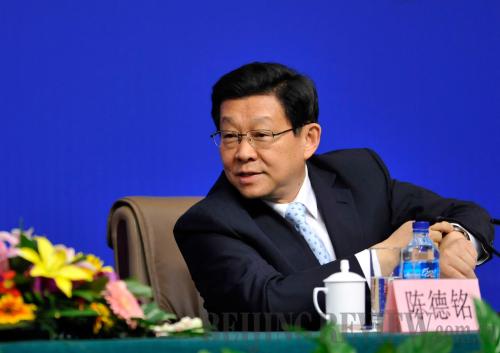|
 |
|
REACTING PRESS: Chinese Commerce Minister Chen Deming reacts during a news conference for the Fifth Session of the 11th National People's Congress (NPC) in Beijing, China, March 7, 2012. China's export and import growth is anticipated to slow to around 7 percent year-on-year for the first two months of 2012 due to seasonal factors, Chen said Wednesday (XINHUA) |
At the Fifth Session of the 11th National People's Congress (NPC) at 10 a.m. on March 7 at the Media Center Hotel in Beijing, a journalist with Reuter's News Agency asked Minister of Commerce Chen Deming: "The U.S. thinks that some of its imported products from China are subsidized by the Chinese government and it wants to increase taxation on these products. Where does the Chinese Ministry of Commerce stand on this issue?"
Chen Deming responded:
I have realized that recently the U.S. president, some ministers and congressmen have reproached China for "violating the rules," and they have focused their reproach on China's "subsidizing actions." First I want to make it clear that China follows the rules and regulations of the international organizations we have joined. For example, we joined the World Trade Organization (WTO) 11 years ago as a new member and developing country. Therefore, we obey the rules and regulations of the WTO. It is not our obligation to conform to any country's internal laws and regulations which are incompatible with those of the international organizations we have joined.
Then, Chen Deming gave an explanation of "subsidy." Chen said:
According to WTO rules, subsidy has a very broad meaning which includes prohibited subsidies and actionable subsidies. Most WTO members offer different kinds of subsidies and have different understandings of subsidies. For example, after the financial crisis broke out, many countries, especially the United States gave financial subsidies to their enterprises, including the three major automobile manufacturing companies and enterprises in a variety of other industries. China followed the G20 leaders' call and did not take new protection measures during the financial crisis. We did not reproach the United States for offering subsidies to their enterprises or launch large-scale countervailing actions.
The United States has been constantly reproaching China for "violating the rules" but it seldom specifies the aspects and areas in which China has disobeyed the rules. I hope we can have dialogues with those countries which have criticized us and negotiate with them on disputes caused by misunderstandings of the concept of "subsidy." I can assure you that the Chinese Government does not offer any prohibited subsidies. China is a large country and if some area here offers prohibited subsidies, we would like to negotiate such problems with relevant countries.
Chen Deming's answer showed his familiarity with WTO rules and won the Reuters journalist's approval. He could have ended his answer here because he had already expressed the Chinese Government's position. However, Chen hit back at U.S. accusations. Chen said:
I cannot understand why since 2006 the U.S. has launched a combined anti-dumping and countervailing investigation into China and filed 31 lawsuits. According to the judgment of 24 lawsuits, we paid a double tariff and our products were prohibited from being exported to the U.S. Then China sued the U.S. Department of Commerce in the U.S. International Trade Court, not according to WTO rules, but according to the laws of the United States. In 2010, the U.S. Department of Commerce lost the lawsuit and a federal appeal because according to U.S. law, it is prohibited to carry out countervailing investigations into non-market economy (NME) countries. And notice that the United States thinks that China is an NME country.
At that time, I expected the U.S. Ministry of Commerce, which had always been reproaching other countries for violating the rules, to correct its own mistakes. But in fact it didn't. The U.S. House of Representatives passed a bill on March 6 to ensure the government can impose controversial countervailing duties on imports from NME countries. At the same time it stipulates that this bill is retroactive to 2006, regardless of the fact that most countries' laws are not retroactive. Such U.S. Congress stipulations and such actions of the U.S. Department of Commerce are not only against international regulations but also against the laws of the United States itself. If China appeals to the WTO, the WTO will decide that the U.S. Department of Commerce loses. I hope that those countries, departments and law enforcement agencies which have reproached China will be strict with themselves and correct their own mistakes. | 